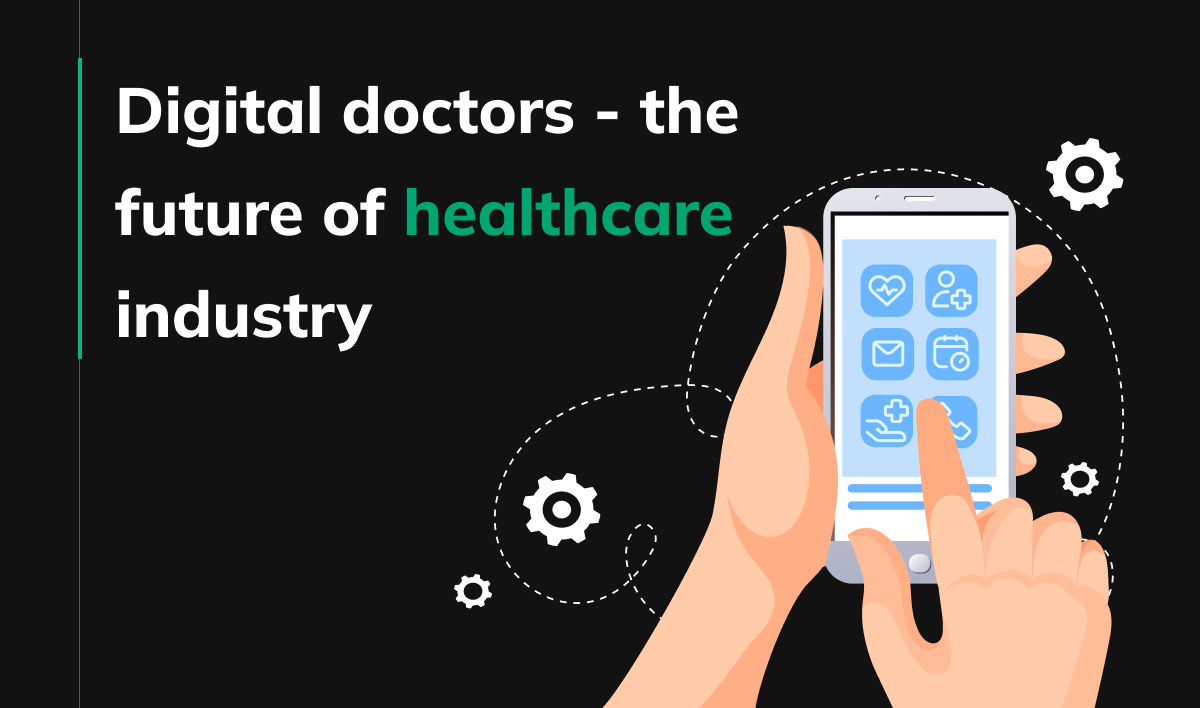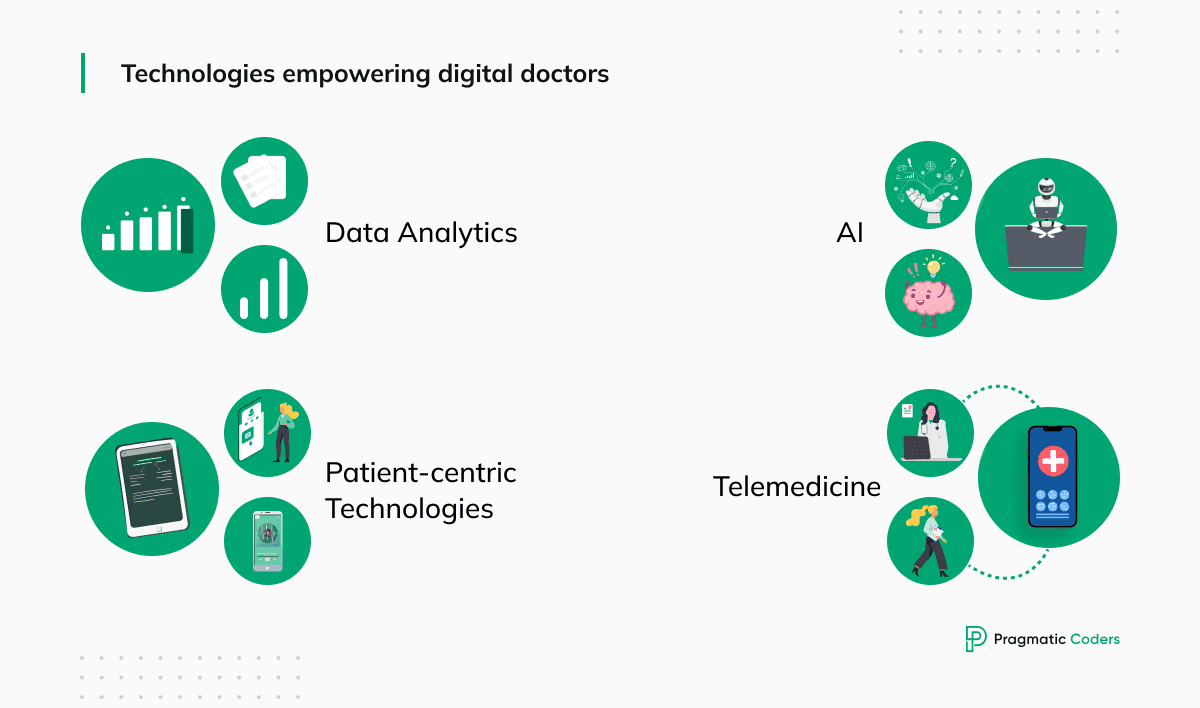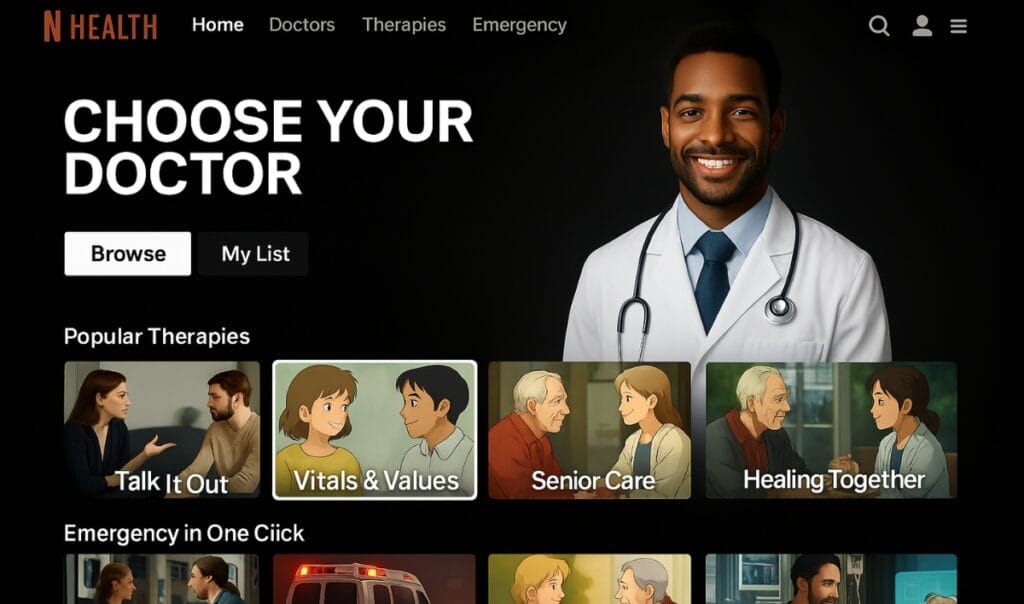Digital Doctors – the future of healthcare industry

Healthcare has evolved remarkably. From the days of handwritten patient records to advanced digital systems, every step has been a leap toward better care. Enter the era of Digital Doctors. These are not your traditional physicians; they represent a blend of medical expertise and cutting-edge technology. But what makes Digital Doctors so crucial for the future of healthcare? We answer this question in the following article.
Understanding Digital Doctors
So, what exactly are Digital Doctors? They are healthcare professionals who expertly utilize digital systems to provide enhanced, data-driven healthcare. The concept itself isn’t new; it has roots in the early days of digital technology’s integration into healthcare. However, the scale and the possibilities are on a completely different level. So, what’s at the heart of this digital health trend?
- Artificial Intelligence (AI): AI in healthcare means smarter, faster diagnostics and treatment plans. It’s about algorithms that can swiftly sift through medical data, aiding doctors in making more accurate decisions. This isn’t just about machines; it’s about enhancing human expertise with machine efficiency.
- Telemedicine: This is healthcare going digital and remote. Patients can now consult with doctors without stepping out of their homes. It’s especially crucial for those in remote areas. Telemedicine isn’t just convenient; it’s a game-changer for accessibility.
- Data Analysis: Here, we’re turning heaps of health data into actionable insights. This isn’t just number-crunching; it’s about understanding patient needs better and tailoring treatments accordingly. Data analysis in healthcare means being proactive, not just reactive.
Together, these components are redefining what it means to receive healthcare. It’s no longer just about the face-to-face doctor visit; it’s about integrating technology to make healthcare more efficient, responsive, and, importantly, patient-centered. Digital Doctors are professionals who fully harness these systems, driving a shift towards a future where healthcare is more accessible, personalized, and data-driven. They’re not just a concept; they’re the new face of modern medicine.
The impact of Digital Doctors on healthcare
It’s evident that Digital Doctors are starting to transform healthcare. How? For starters, they can offer improved patient care that’s both personalized and swift. Imagine a world where getting a diagnosis and a tailored treatment plan takes less time than ever. It’s not just about speed; it’s about precision and understanding each patient’s unique needs.
Efficiency is another significant advantage. With Doctors implementing modern technologies, the long waits and inefficiencies that often frustrate patients and strain healthcare systems could become a thing of the past. Digital Doctors streamline processes, from appointments to diagnoses, ensuring that healthcare resources are used more effectively. This efficiency isn’t just about saving time; it’s about enhancing the quality of care.
And when it comes to cost, Digital Doctors and their approach is a game changer. They’re helping to lower expenses across the board. How? By reducing the need for repeat visits, minimizing the likelihood of errors, and optimizing resource allocation. This means more affordable care for patients and reduced operational costs for providers. Moreover, by leveraging digital tools, healthcare systems can scale their services more effectively, catering to a larger patient base without compromising on quality.
Digital Doctors are not just advocates for technological upgrades; they embody a complete redefinition of healthcare as we know it. They’re paving the way for a system that’s not only more efficient and cost-effective but also more responsive to the needs of each individual patient. It’s a true win-win scenario, benefiting everyone involved in the healthcare development journey.
Technological advancements behind Digital Doctors
Let’s dive into the tech powering Digital Doctors. At the core, we have AI and Machine Learning. These aren’t just buzzwords; they’re crucial tools that make diagnosing and planning treatments smarter and more accurate. How? By analyzing medical data faster than ever, these technologies help doctors make informed decisions quickly.
Then there’s telemedicine. It’s like a bridge connecting patients and doctors, no matter the distance. This means even people in far-off places can get the medical attention they need. It’s especially vital for areas where healthcare facilities are sparse. Telemedicine is more than just convenience; it’s about equal access to healthcare for everyone.
Big Data and Analytics also play a key role. They turn heaps of health data into valuable insights. This isn’t just about storing information; it’s about using it to predict health risks and monitor patient health constantly. Imagine being able to prevent illnesses before they even occur. That’s what predictive healthcare is all about.
These technologies are also empowering patients to take an active role in their healthcare. With apps and online platforms, patients can track their own health, schedule appointments, and even communicate with their doctors online. It’s a shift towards more patient-centered care.
Additionally, these advancements are making healthcare more collaborative. Doctors can share insights and work together on complex cases, regardless of their physical location. This collaborative approach is leading to better patient outcomes and more efficient healthcare delivery.
In essence, the technology used by Digital Doctors isn’t just shaping the future; it’s defining the present. It’s transforming how healthcare is delivered, making it more efficient, accessible, and personalized. These advancements and the people who use them bring us closer to a better healthcare system for all.

Challenges and considerations
Even with its benefits, the path Digital Doctors are taking isn’t without hurdles. Firstly, let’s talk about the digital divide. It’s a real issue – not everyone can easily access these advanced technologies. This gap is especially wide in less affluent areas or for older populations. How do we ensure that everyone, regardless of their location or economic status, can benefit from these advancements?
Privacy and data security are another concern. When we deal with sensitive patient information, keeping it safe is crucial. As healthcare goes digital, the risk of data breaches increases. We need robust security measures to protect patient privacy. How can we guarantee that personal health information stays secure in this digital age?
Then there’s the question of balancing technology with the human touch. Yes, machines are efficient, but healthcare is more than just numbers and data. It’s about people. How do we maintain that essential human connection between doctors and patients in a digital world?
We also need to consider the training and adaptation required for healthcare professionals. As technology evolves, so must their skills. But how do we ensure ongoing education and support for these professionals to effectively use these new tools?
Moreover, regulatory challenges can’t be overlooked. With technology constantly advancing, regulations need to keep pace to ensure safety and efficacy. How do we navigate the complexities of healthcare regulations in a rapidly changing digital environment?
Addressing these challenges is key as we move forward. It’s about finding the right balance and ensuring that digital healthcare is accessible, secure, and retains the human element that is at the heart of medicine. These aren’t just hurdles; they’re opportunities to build a more inclusive, secure, and empathetic healthcare system with Digital Doctors at its center.
The role of software houses in shaping digital healthcare
Software houses are at the forefront of this revolution. As the architects behind digital health solutions, they bring together medical professionals and tech experts. This collaboration is leading to exciting innovations and future trends. But what’s next in this journey? That remains an open and thrilling question. Pragmatic Coders’ healthcare software developers are actively working on preparing the answers.
Conclusion
In conclusion, Digital Doctors are not just a trend; they’re a transformative force in healthcare. As technology continues to advance, its role in medicine becomes increasingly significant. Now is the time to explore and adopt these digital solutions in healthcare.




